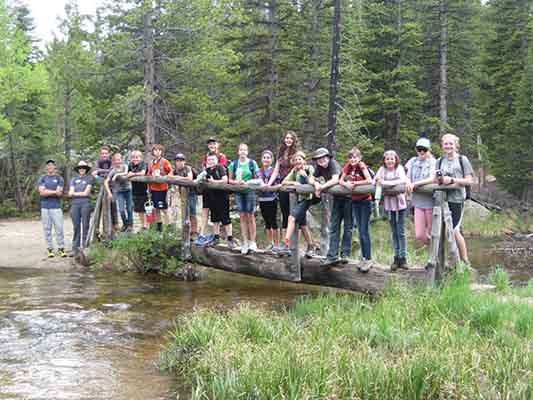Last updated: December 28, 2017
Lesson Plan
Student as Researcher Camp (Multi-day)

- Grade Level:
- Middle School: Sixth Grade through Eighth Grade
- Subject:
- Science
- Lesson Duration:
- 90 Minutes
- Common Core Standards:
- 8.RI.8, 6-8.RST.1, 6-8.RST.7, 8.SL.1, 8.SL.4, 8.SL.5, 6-8.WHST.1, 6-8.WHST.2, 6-8.WHST.9
- Additional Standards:
- MS-LS2
MS-LS2-1
MS-LS2-2
MS-LS2-3
MS-LS2-4
MS-LS3
Objective
“Students as Researchers” Camp gives students the opportunity to conduct their own scientific research over the course of a week at two different outdoor research sites.
Background
Summer camps are an exciting way to keep students learning year round and not just during the traditional school year. There are many options for students to pick from for summer activities and this camp takes advantage of being outdoors in the summer and learning about nature / science at the same time. “Students as Researchers” Camp gives students the opportunity to conduct their own scientific research over the course of a week at two different outdoor research sites.
At its core, this camp provides the chance for students to make choices—by exposure to different topics they will pick a research topic, decide on research partners, determine how to conduct their research, and problem-solve different choices in team building challenges. The article “Choices for Children—Why and How to Let Students Decide” describes several benefits for giving students choices: “(1) Effects on general well-being—it is desirable for people to experience a sense of control over their lives, (2) Effects on behavior and values—if we want children to take responsibility for their own behavior, we must first give them responsibility, (3) Effects on academic achievement—deprive students of self-determination will likely deprive them of motivation, (4) Effects on teachers—the job becomes a good deal more interesting when it involves collaborating with students to decide what is going to happen, and (5) Intrinsic Value—allowing people to make decisions about what happens to them is inherently preferable to controlling them.” (Kohn, 1993)
It is important to provide time for students to learn about each other and bond together as a large group and as smaller research groups. Each non-traveling day includes a “Get to Know You” or “Team Building” time to promote bonding within the group and to challenge students to make choices and to alter their choices to solve a problem. Within the document are suggestions for different activities, but if an instructor wishes to look for other ideas, there are many books and websites available with alternate activities. The instructor should choose an activity that applies to the needs of the group.
Each day includes a focus question to share with students to help them understand the purpose of the day. Also, included are “Magic Words”. Depending on the instructor’s comfort level, it is fun to play with the students. Every time a student says the “Magic Words” everyone makes a happy sound or the group can keep track of number of times the words are used for a treat at the end of the day. “Magic Words” is also a way to keep student attention focused on the focus question of the day.
Preparation
See individual camp days.
Materials
Overview of daily schedules, standards, and more.
Download Student as Researcher Camp Introduction
Download Student as Researcher Camp Day 1
Download Student as Researcher Camp Day 2
Download Student as Researcher Camp Day 3
Download Student as Researcher Camp Day 4
Download Student as Researcher Camp Day 5
Four major orders of Mammals (Day 1)
Download Student as Researcher Camp PowerPoint 1
Insect Orders (Day 2)
Download Student as Researcher Camp PowerPoint 2
Graphs (Day 5)
Download Student as Researcher Camp PowerPoint 3
Lesson Hook/Preview
See individual camp days.
Procedure
See individual camp days.
Vocabulary
Day 1: characteristic, mammal, ungulate, carnivore, rodent, lagomorph, pace, independent variable, dependent variable
Day 2: organism, Coleoptera, Hymenoptera, Odonata, Hemiptera, Lepidoptera, Homoptera, Orthoptera, Diptera, diversity
Assessment Materials
Poster Presentations (Day 5)Students prepare posters showing the research they conducted during the week comparing between the two different locations. The students should invite parents and guests to come and view their research.
Prepare Poster Presentations: Students prepare posters showing the research they conducted during the week comparing between the two different locations. The title should be short and draw interest to the research. There should be a mixture of tables, graphs, and photos with brief text explanations. Students should include a written conclusion about their findings that supports or negates their hypothesis. Any pictures should have captions and credit the photographer. Since this is a one-week summer project, the posters can be more informal.
Supplies needed: posters, markers, sharpies, glue, computer paper, graph paper
Poster Presentation for Parents and Guests: The students should invite parents and guests to come and view their research. Students should stand by their projects and be willing to explain their research to anyone coming up to their table. If pictures were taken during the week, the instructor should prepare a PowerPoint slide show that guests can enjoy and get a glimpse into their son/daughter’s week.
Supplies needed: student posters, PowerPoint slide show (?)
Additional Resources
Credit to: Mary Klass, Geological Society of America, Geocorps America Program; Retired Poudre School District, Fort Collins, CO, Science Teacher
Sally Plumb, Retired, National Park Service, Natural Resources Stewardship and Science
Featured Photo: Courtesy of Mary Klass.
